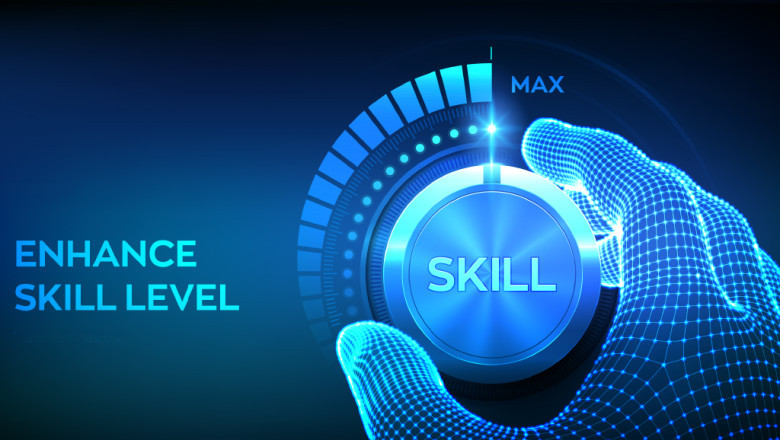views

As we move deeper into the 21st century, the nature of work is changing rapidly. The rise of automation, artificial intelligence (AI), the gig economy, and other technological advancements are reshaping industries, job roles, and the skills required to succeed. To remain relevant in the evolving workforce, it's essential to understand the skills that will be in demand. This article highlights the key skills you need to stay ahead in the future of work.
The Changing Landscape of Work
The workplace is transforming, and the traditional 9-to-5 model is evolving. Factors such as technological disruption, demographic shifts, globalization, and the ongoing impact of the COVID-19 pandemic have accelerated the pace of change. Here are some of the critical forces driving this transformation:
-
Automation and AI: As machines take over routine, repetitive tasks, human workers will increasingly focus on jobs that require creativity, complex problem-solving, and emotional intelligence.
-
Remote and Hybrid Work: Remote work is no longer a temporary shift but a permanent feature of the global workforce. Companies are adopting hybrid models where employees work both from home and the office.
-
The Gig Economy: Freelancing and contract-based work are on the rise. More people are choosing to work independently, creating opportunities for specialized skills.
-
Global Talent Pool: With digital tools enabling global collaboration, organizations are no longer limited by geographic boundaries when hiring talent.
Key Skills for the Future of Work
To stay relevant in the future job market, individuals need to cultivate a diverse set of skills. Below are the most crucial skills you will need in 2050:
1. Digital Literacy and Technical Skills
With technology integrated into every aspect of the workplace, digital literacy will be fundamental. Professionals need to be proficient with tools like productivity software, communication platforms, and emerging technologies like AI, data analytics, and blockchain.
-
Key Areas: Data analysis, machine learning, coding, cybersecurity, and cloud computing.
2. Adaptability and Learning Agility
The future of work will be characterized by rapid change, so the ability to adapt and learn new skills quickly will be vital. Workers will need to demonstrate flexibility in their roles and a willingness to upskill and reskill.
-
Key Areas: Critical thinking, problem-solving, and the ability to learn new tools and technologies.
3. Emotional Intelligence (EQ)
While automation and AI can perform tasks, they cannot replicate human emotions or understand nuanced social dynamics. Emotional intelligence, the ability to manage and harness emotions, will be an essential skill for leadership, teamwork, and customer service.
-
Key Areas: Empathy, communication, relationship building, and conflict resolution.
4. Creative Thinking and Innovation
Machines can analyze data, but humans excel at thinking creatively. The future of work will require employees who can think outside the box, solve complex problems, and bring innovative solutions to the table.
-
Key Areas: Design thinking, creative problem-solving, and innovation management.
5. Collaboration and Teamwork
Even with the rise of automation, human collaboration remains critical to success. Teams will be increasingly diverse, with remote and global team members working together. Effective communication and collaboration skills will be essential to make virtual teams successful.
-
Key Areas: Cross-cultural communication, virtual teamwork, and conflict management.
6. Leadership and People Management
As work becomes more flexible and decentralized, strong leadership skills will be crucial. This includes not only managing teams but also inspiring, motivating, and guiding employees through change.
-
Key Areas: Decision-making, leadership styles, conflict resolution, and team motivation.
7. Entrepreneurial Mindset
As the gig economy continues to grow, many people will work as freelancers or start their own businesses. Having an entrepreneurial mindset is key to navigating this new environment.
-
Key Areas: Innovation, risk-taking, business acumen, and networking.
8. Sustainability and Green Skills
As climate change becomes an increasingly urgent issue, industries will prioritize sustainability and environmental responsibility. Workers with knowledge of sustainable practices and green technologies will be highly sought after.
-
Key Areas: Renewable energy, sustainable business practices, waste management, and environmental impact analysis.
9. Cultural Competence
The global nature of today’s workforce requires understanding and appreciating cultural differences. Being culturally competent will help you collaborate with diverse teams and clients, making you an invaluable asset to any organization.
-
Key Areas: Cross-cultural communication, global market understanding, and language skills.
10. Self-Management and Time Management
As remote and hybrid work becomes more common, employees will be expected to manage their time effectively without direct supervision. Strong organizational skills and the ability to prioritize tasks will be key to maintaining productivity.
-
Key Areas: Time management, goal-setting, and self-discipline.
How to Develop These Skills
Building the skills necessary to stay relevant in the future workforce will require ongoing effort and commitment. Here are some practical tips for skill development:
-
Enroll in Online Courses: Platforms like Coursera, Udemy, and LinkedIn Learning offer a wide range of courses in digital skills, leadership, and other key areas.
-
Attend Workshops and Conferences: Stay updated with the latest trends by attending industry workshops, seminars, and conferences, either virtually or in person.
-
Seek Mentorship: Learning from industry leaders or experienced professionals can provide valuable insights and guidance on career advancement.
-
Practice Lifelong Learning: Develop a habit of continuous learning, whether through reading books, listening to podcasts, or taking part in discussions and forums.
-
Develop Soft Skills: Engage in activities that improve your emotional intelligence, creativity, and communication, such as volunteering, taking on leadership roles, or participating in team projects.
Conclusion
The future of work is rapidly evolving, and staying relevant will require a combination of technical, soft, and interpersonal skills. By focusing on digital literacy, adaptability, creativity, and emotional intelligence, you will be better prepared to succeed in the workplaces of 2050. As automation takes over routine tasks, it will be the uniquely human skills that will continue to drive success and innovation.
Embrace lifelong learning, stay agile, and develop the skills that will allow you to thrive in a dynamic and fast-changing world.












Comments
0 comment